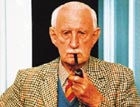Book Review :Rupert Hart-Davis: Man of Letters
Michael Sissons says this biography of Rupert Hart-Davis is required for its view of 20th-century literary life


Rupert Hart-Davis looks at us unsmiling in late middle age from Philip Ziegler's elegant biography. He sports a tweed jacket, matching shirt, MCC tie, clipped moustache, pipe clenched between his teeth, not displeased with himself as befits a man recently in receipt of a knighthood.
I remember him somewhat earlier in life, with less to be pleased about. Born in 1907, he was a figure of his generation who would today appear an anachronism. He was obsessed with his mother, Sibbie, with whom he exchanged torrents of passionate letters. He was idle at Eton, getting into Balliol on the strength of a letter from his housemaster guaranteeing 'Hart-Davis is all right!' He repaid this vote of confidence by leaving Oxford in short order, declaring he had neither the will to work hard nor enjoy himself.
He became an actor in 1927. That didn't last long, but he met and married the actress Peggy Ashcroft, the latest young woman to whom he had addressed passionate but virginal letters. Peggy was not on for what he described as 'intellectual and spiritual passion', and proceeded to have a 'protracted and torrid relationship' with J. B. Priestley, which scuppered the marriage within two years. He had no success as an actor, and was urged by friends to turn to publishing, for which no training was required.
He bumped along as a junior editor through the 1930s, remarried, spent the war in England with a commission in the Grenadiers, emerging in 1945 to find himself sacked by Jonathan Cape for making peremptory salary demands. He was encouraged by friends to found Rupert Hart-Davis Ltd.
His biographer is in no doubt about his standing as a publisher: 'He was deluding himself... He was seriously under-funded... Hart-Davis's from the start was a last resort for the sort of literary product that more commercial publishers would baulk at.' Ziegler has a wicked footnote to the story of Hart-Davis turning down Samuel Beckett's Molloy as 'unreadable rubbish'. 'Probably vainglory... There is no reason to believe that anybody was silly enough to offer him Molloy, but he would certainly have turned it down if they had.'
I met him when I had become a literary agent, a trade which he hated as parasitical. I found him pompous and amateurish beyond words. He was of a generation of publishers who thought themselves culturally, socially, and politically significant, and many had knighthoods to prove it. Times have changed indeed.
And yet... he was truly a Man of Letters. He was phenomenally well read. He cared passionately about good writing and wrote some good non-fiction himself. He was an excellent editor, and this is what he should have been. In later life he edited 25 distinguished literary volumes.
Exquisite houses, the beauty of Nature, and how to get the most from your life, straight to your inbox.
He epitomised the dilemma of modern publishing. He hated business, and like many good editors should never have been let near a cheque book. But he was the sort of editor, meticulous and sure in his judgments, that publishing needs today. Vastly improved marketing has brought huge benefits to the profession of author, yet publishing will not thrive in the creative economy of the future if it ceases to be creative. Ironically, Hart-Davis is blessed with a biographer who was both an excellent publisher and editor, and is a brilliant author. For anyone who enjoys the literary life of the 20th century this is unputdownable.
Country Life is unlike any other magazine: the only glossy weekly on the newsstand and the only magazine that has been guest-edited by His Majesty The King not once, but twice. It is a celebration of modern rural life and all its diverse joys and pleasures — that was first published in Queen Victoria's Diamond Jubilee year. Our eclectic mixture of witty and informative content — from the most up-to-date property news and commentary and a coveted glimpse inside some of the UK's best houses and gardens, to gardening, the arts and interior design, written by experts in their field — still cannot be found in print or online, anywhere else.
